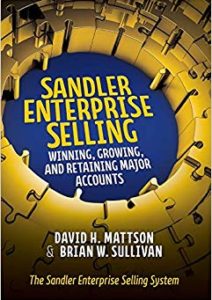In turbulent times, it’s especially critical to stay connected with others, to help and to serve. While we typically think first of family and friends, our connections with clients and prospects in difficult times are important as well. In Sandler Enterprise Selling, we teach a process that adds clarity to these business connections and, given the dynamic nature of selling, it’s refreshed frequently. And our clients worldwide are extremely active with it now, as their prospects and clients, of course, are experiencing great change.
First, some background. In selling, we work with logical account groupings. We bundle accounts into vertical categories, grouping together healthcare, technology accounts, and others. We also differentiate geographically, adding efficiency by grouping physical locations. Account size also dictates designations in bundling organizations of similar revenues, numbers of employees or other relevant metrics. And of course, we separate commercial and public sector accounts. We do all of this to be more effective in our efforts to win business – it certainly makes sense. And while these descriptive designations are helpful, what do they tell us about the actual traits and tendencies of the accounts? How does the information help us build actionable strategies to win, grow, and keep major clients?
Consider this. In the animal kingdom, we group creatures into categories that provide scientific value. But how valuable is it, for example, to know that two different creatures are both snakes? While King Cobras and Garden Snakes are technically in the same classification, their individual traits and tendencies are dramatically different, to say the least. Similarly, with spiders, it would be much more valuable to be forewarned about the behavior you can expect from a Black Widow versus a Daddy Long Legs than to simply know that they’re family members. So, while scientifically accurate, knowing that creatures are in certain categories tells you nothing about the actions you should take when you encounter them, or what to expect from them. The information is not actionable, not meaningful.
The same applies to accounts, although perhaps not at such a life-threatening level. But understanding account differences in terms of traits and tendencies can be as valuable as knowing that you’re far better off with a Garden Snake in your house than a King Cobra.
So, how do you make your account profiles meaningful, especially now with all the changes we’re experiencing? In Sandler Enterprise Selling, we use KARE to profile accounts into four categories – Keep, Attain, Recapture, and Expand. Let’s look at each. Keep accounts are your average clients. They’re not rainmakers, but they generate the majority of your revenue and you’re happy to have them. Attain accounts are your profile prospects. You target them, working hard to win their business. Recapture accounts are previous clients that are no longer active. Unlike past clients whose business you consciously choose not to pursue, you’d love to welcome Recapture accounts back. Lastly, Expand accounts represent your most treasured assets. You’ve invested in them and would look to invest further to promote closer partnerships and future growth. These are the strategic clients you tuck in at night. They are your future.
Of course, one selling organization’s KARE accounts will be different from another’s, so meaningful profiles are built by crafting customized attributes specific to your business. Once you’ve built your custom KARE profiles, you align your accounts in the appropriate profiles. You’ve then earned the right to develop the common actions that apply to each category. For your Recapture accounts, for example, you’ll identify the actions to win them back. While you’ll certainly customize individual account pursuit strategies, your Recapture actions will apply to each of these past customers, saving you time and effort. The same applies to your Keep, Attain, and Expand accounts. The actions apply because remember – the accounts in each profile share the same attributes, the same traits, and tendencies. That’s the beauty of meaningful profiles – they’re truly actionable!
Regarding this difficult time, most of our prospects and clients are facing unprecedented levels of change. Their needs wants and pains are very different than even a short time ago. Certain Keep accounts may be in serious trouble or may have already, unfortunately, become Recapture accounts. Some Attain accounts may be much closer to becoming clients due to increased needs for your products and services. And being acutely aware of changes in account traits and tendencies may position you to help certain Keep accounts grow to become Expand accounts.
So, know your accounts well. But don’t be complacent thinking that you’ve done enough by identifying the Black Widow and King Cobra as spiders and snakes respectively. Elevate to an actionable level by understanding their traits and tendencies well enough to know they belong in the Killers category. Then, you’ve earned the right to take meaningful actions.
KARE – for your accounts. Especially now.












Comments